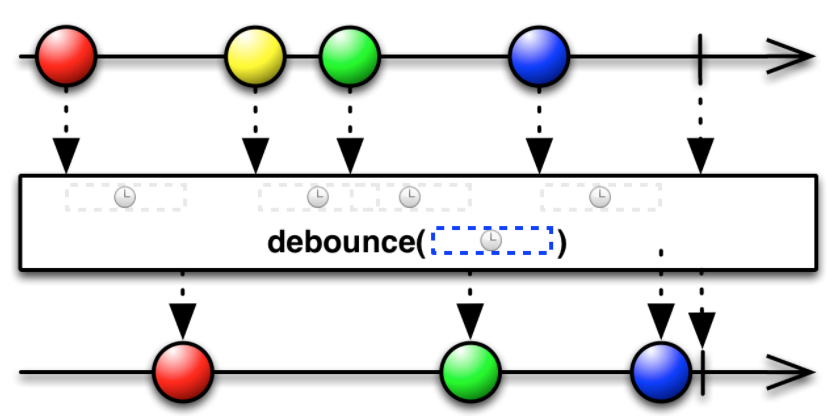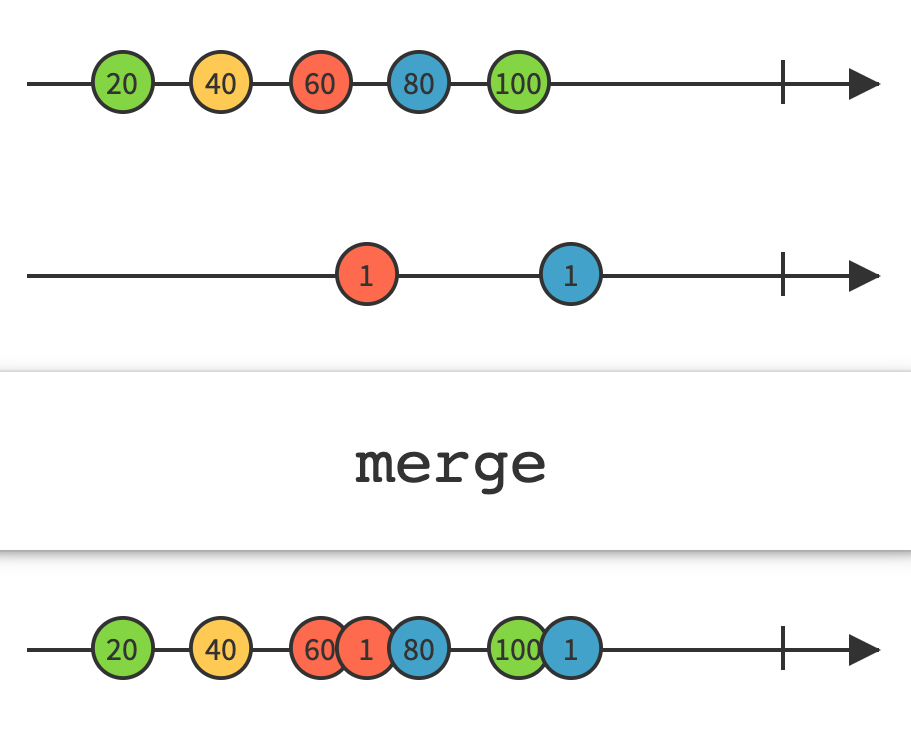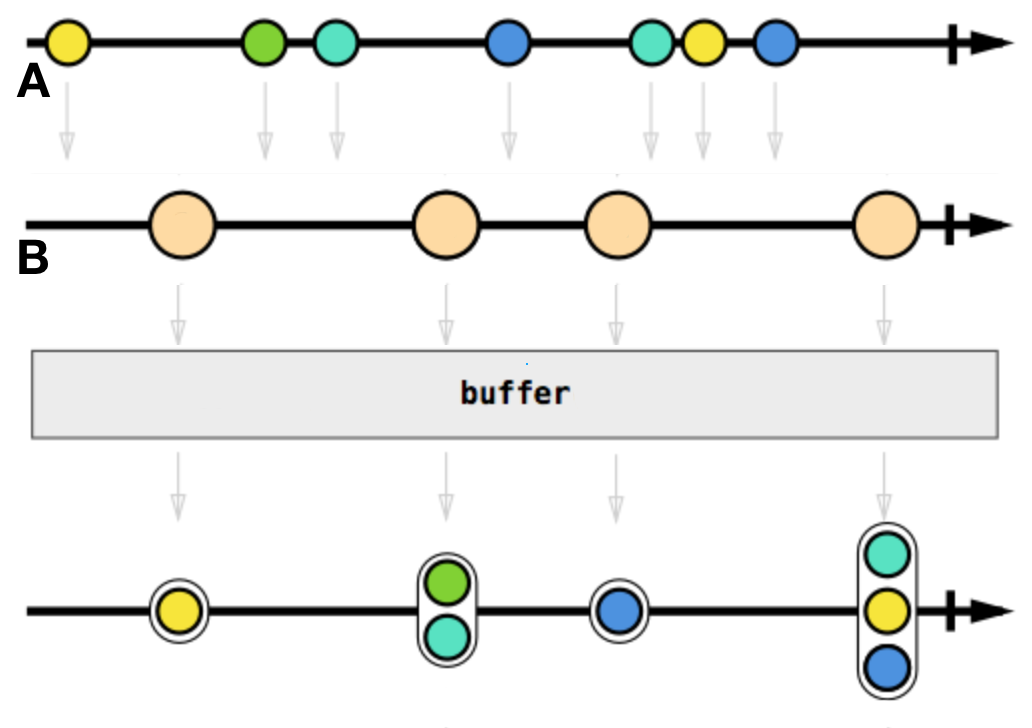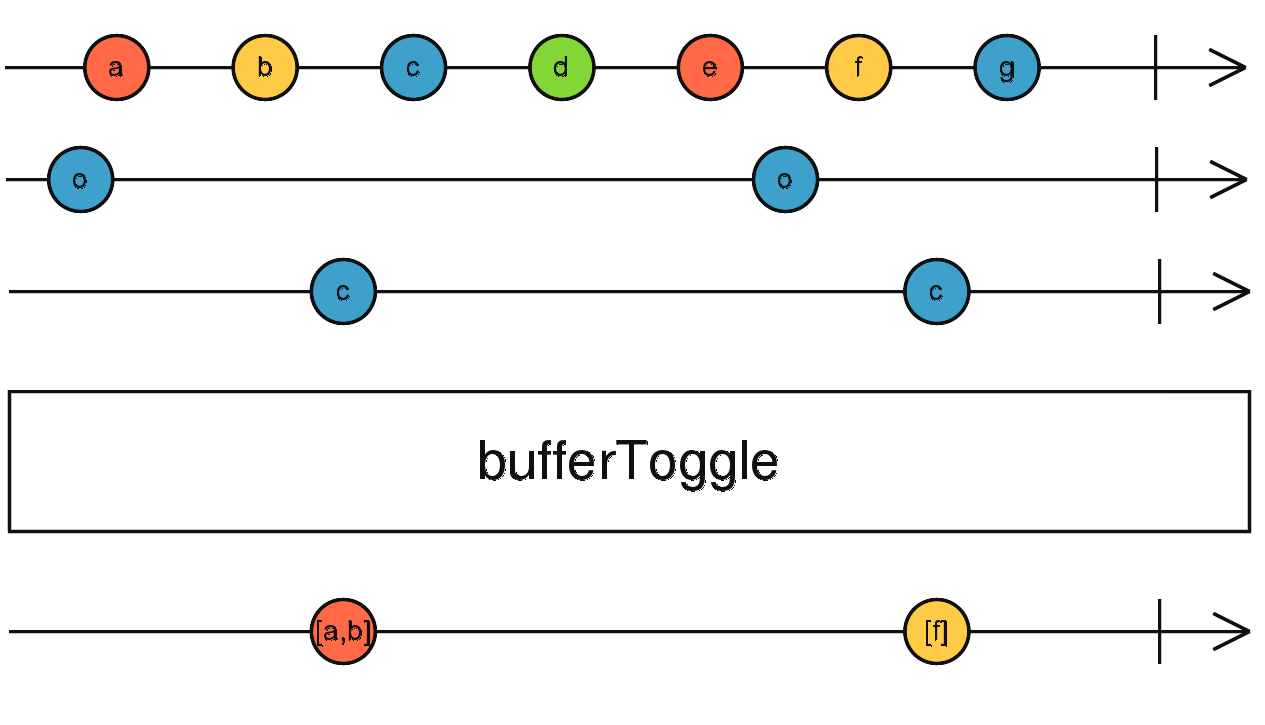Reactive Programming
Junghoo Cho
cho@cs.ucla.edu
Summing an Array
let sum = 0;
for (let i = 0; i < a.length; i++) {
sum += a[i];
}
console.log(sum);
- Q: What if
ais a list not an array? - Code needs to be rewritten because a list does not support
a[i]!
Summing an Array
let sum = 0;
for (let i = 0; i < a.length; i++) {
sum += a[i];
}
console.log(sum);
- What we really want is
- “next” item in general, not
i++in particular - checking for the end, not
i < a.length
- “next” item in general, not
- Iterable: generalization of array
next(): returns the next item in the iterableend(): returnstrueif we reached the end
Iterable: Example
let sum = 0;
while (!a.end()) {
sum += a.next();
}
console.log(sum);
- Doesn’t matter if
ais an array, list, table, … - Q: What happens if
ais coming over the network? We don’t want to get stuck waiting for the next item!
Iterable: Example
let sum = 0;
while (!a.end()) {
sum += a.next();
}
console.log(sum);
- What we really want is
- Sum the next item when it is available
- Print the sum when all is done
- Observable: generalization of iterable
onNext(e): called on every itemeonCompleted(): called when done
Observable: Example
let sum = 0;
a.onNext = (x => { sum += x; });
a.onCompleted = (() => { console.log(sum)); });
Iterable vs Observable
| Task | Iterable | Observable |
|---|---|---|
| Consume Item | T next() | onNext(T) |
| Encounter Error | throw Error(e) | onError(e) |
| Finish | end() | onCompleted() |
- Observable is mostly assumed to be “push”
- But it doesn’t have to be
- We don’t really care how it is implemented
Key Terminology
- Observable
- An object that produces a sequence of “events”
- “Publisher”
- Observer
- An object interested in the events from an observable
- “Subscriber”
Everything is Observable!
- Array is observable
- Iterable is observable
- Events are observable
- Variable is observable
- John is observable
- He gives lectures
- He assigns projects
- As long as we get notified, we don’t care how they are done
- The world is full of observables!
Reactive Programming
- Write program as a a set of “operators” performed on observables
- Everything is observable!
- Program consists of “reactions” to input events
- Reactive programs “react to” input events
Operator
- Operator transforms input observables to output observables
- Observable(s) → operator → Observable(s)
- Example:
filter(x > 0)- 10, -2, 3, -1, … →
filter(x > 0)→ 10, 3, …
- 10, -2, 3, -1, … →
- Complex operators can be created by “piping together” simple operators
- Obsv → op1 → Obsv’ → op2 → Obsv" → …
- Final goal: Using simple operators, convert single-click stream into double/triple/… clicks if there is less than 250ms pause in between clicks
Operator: Transform
filter(): “filter” only those events that meets a conditionfilter(x => x > 0): 1, -3, 2, -1, 3, … → 1, 2, 3, …
map(): “map” every input event to an output eventmap(x => 2*x): 1, 2, 3, … → 2, 4, 6, …
flatmap(): one input event produces multiple output events. “flatten” the output to single event streamflatmap(x => [x, x+10]): 1, 2, … → 1, 11, 2, 12, …
Operator: Aggregate
reduce(): perform cumulative operation on (result-so-far, new-input) and produce one final output at the endreduce((a, b) => a+b): 1, 2, 3 → 6
scan(): similar to reduce, but one output per every inputscan((a, b) => a+b): 1, 2, 3, … → 1, 3, 6, …
Operator: Buffering
buffer(time): “buffer” input events for the specified period and produce buffered inputs as outputbuffer(250ms): 1, 2, 3, 4, 5, … → [1, 2], [3, 4, 5], …
bufferTime(bufferTimeSpan, bufferCreationInterval): “buffer” forbufferTimeSpaneverybufferCreationIntervalbufferTime(50ms, 100ms): 1, 2, 3, 4, 5, … → [1, 2], [4, 5], …
bufferCount(m, n): “buffer”mevents everyninput eventsbufferCount(3, 2): 1, 2, 3, 4, 5, … → [1, 2, 3], [3, 4, 5], …
Operator: Throttling
debounce(time): produce an output after a specified period of inactivity
Multi-Way Operators
- Operators so far: one input, one output
- Operators next: multiple inputs, one output
Operator: Example
merge(): “merge” events from all input streams into a single output stream
Operator: Example
zip(): take one event from each input stream and generate an output from the pair
Operator: Example
A.buffer(B): buffer events from A until B emits a new event
Operator: Example
A.bufferToggle(openings, closings): buffer events from A from openings until closings
Operator: Example
join(): produce one output per every input event pair within a time window
- See RxJS operators for more operators
Simple to Complex: Example
- Convert single-click stream into double/triple/… clicks if there is less than 250ms pause in between clicks
- Q: Can we do it using operators that we have seen so far?
- A: Operators to use
buffer()debounce(250ms)
clickstream.buffer(clickstream.debounce(250ms)).map(e => e.length);
Consuming Observable: subscribe
- Once desired observable is created, observer can set
onNext,onError,onCompletedhandlers to take appropriate actions obsv.subscribe(onNext, onError, onCompleted)- Bind
onNext,onError,onCompletedhandlers to the observableobsv
- Bind
When is Observable Useful?
- Observable can be used for any type of programming
- But it is particularly useful when dealing with stream of events
- UI apps
- Asynchronous programs
- …
Declarative Programming
- Reactive program is declarative
- We specify what to do, not how to do
- Different from procedural or imperative programming
- Declarative program provides enormous optimization opportunity
- We don’t care when, where, and how our program is executed
- Push or pull, here or there, we don’t care
- System can decide the best way to execute the program
- SQL, Map/reduce, …, can be seen as reactive programs
Pure Function
- The same input, the same output
- Output is determined only by input
- Function can be understood on its own, nothing else
- No side effect
- Function does not change outside “states”
- “Immutable object”
- Do not modify input parameter directly
- Create a new separate output object
- No need to worry about leaving “unexpected side effect”
Pure Function
- Pure functions make programs
- Easy to understand
- Easy to predict its behavior
- Easy to debug and maintain
- Reactive programs are expected to use pure functions
- Strongly encouraged, but not strictly enforced in most cases
Reactive Program: Properties
- Functional
- Declarative
- Asynchronous
→ leads to easy-to-understand, easy-to-optimize, easy-to-maintain program
RxJS
- RxJS: JavaScript library for Reactive programming
- Many tutorials on reactive programming at http://reactivex.io
- Combine Framework: Swift API for reactive programming on iOS/macOS
What We Learned
- Iterator:
next(),end() - Observable:
onNext(),onCompleted()- Observable and observer
- Reactive program
- Operators on observables
- Pure functions
- Declarative (vs procedural)
- Reactive programming is a generalization of event-driven program, SQL, map/reduce, …